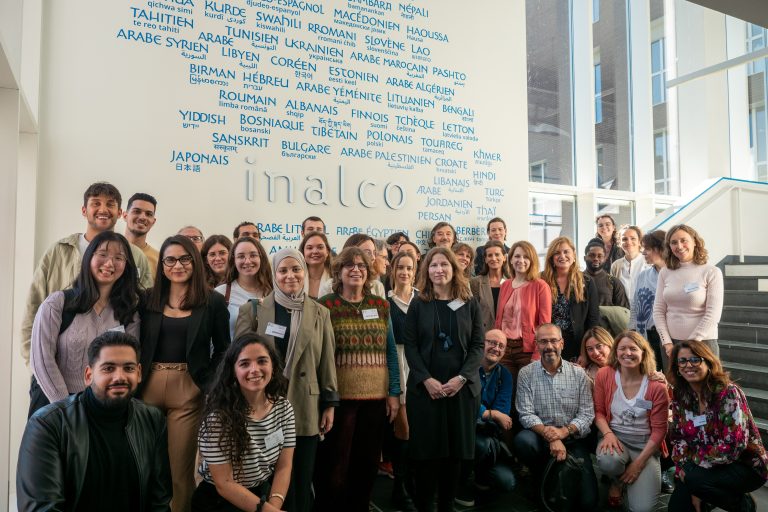ERUA / EUniWell
Cross-European University Alliance Symposium to launch the ERUA Language Policy
Paris, October 10-11 2024
On October 10th and 11th, 2024, took place in Paris the joint conference organized in hybrid format by the ERUA and EUniWELL alliances, entitled “Living Language Policies – Lived Multilingualism”. This event brought together students, academic staff, and administrative personnel from the universities of both alliances for a dynamic and groundbreaking discussion on the place of multilingualism in teaching, learning, communication and governance in the Higher Education sector.
The two-day event was held at Campus Condorcet (Université Paris 8) and Inalco. It began with opening addresses from ERUA and EUniWELL representatives, followed by a presentation on the EU’s multilingualism policy and its latest developments by Anna Solé Mena, Senior Expert on Multilingualism at the European Commission. This set the stage for the conference, highlighting the importance of multilingualism in European higher education.
The first day featured insightful keynotes from Academics specializing in Multilingualism and Language Sciences, along with a powerful speech from Margot Vanduynslager, Student in a Bachelor of European Studies at KU Leuven University, and representing the UNA EUROPA Alliance. Besides those keynotes, was also presented to the participants the ERUA Joint Statement on Language Policy, by Theo Marinis, Professor of Multilingualism at the University of Konstanz (EUNIWELL). All the presentations emphasized the crucial role of interculturality in shaping multilingual universities and underscored the transformative potential of language diversity in European higher education and its critical role in fostering more inclusive, globally-minded academic communities.
Following these discussions, the day continued with a roundtable on “Multilingual Pathways in Research, Teaching, Communication, and Governance.” Moderated by Prof. Francesca Chiusaroli and Giuseppina Larocca from the University of Macerata (ERUA), the panel featured Hanane Boutenbat, Director of the Language Centre at Paris 8 University; Charlotte Mende, a Master’s student in the Language-Media-Society program at European University Viadrina Frankfurt/Oder (ERUA); Laurent Rouveyrol, Professor of English and Applied Linguistics at Sorbonne Nouvelle University (YUFE); and Gilles Forlot, Professor of Language Sciences and Vice-President for International Affairs at Inalco. The roundtable allowed the panelists to share their expertise and experiences, delving into the nuanced differences between plurilingualism and multilingualism. This exchange fostered a deeper understanding of language diversity, language ideology and its impact on academia and governance.
The second day of the event, held at Inalco, was dedicated to hands-on workshops, exploring three key language-related themes. The first workshop, led by Charlotte Mende, titled “Language in Your Life,” focused on language ideologies and how individuals navigate their lives through the languages they speak. Participants took part in activities such as the “Language Portrait” exercise, where they reflected on and colorized the languages in their lives, exploring how they perceive and use them in daily interactions.
The second workshop, “Bridging Language Diversity,” led by Prof. Hanane Boutenbat, tackled the complexities of linguistic diversity within European Alliances. The session highlighted the benefits and challenges of implementing multilingual and plurilingual policies, emphasizing the role of global citizenship and enhanced educational experiences through diverse language policies.
The workshop also addressed obstacles such as institutional resistance, resource allocation, and quality assurance. Participants discussed strategic approaches to overcoming these challenges, the importance of refining terminology like plurilingualism and multilingualism, and the potential for AI tools, autonomous learning, and inclusive curricula to enrich language education.
The last workshop, “Research in Multilingualism and Plurilingualism within ERUA and EUniWELL,” led by Prof. Theo Marinis, explored how European university alliances approach and implement multilingual and plurilingual policies in education, research, and governance. The session examined comparative research on language diversity, strategies for fostering inclusive multilingual environments, and the impact of these policies on academic collaboration, student mobility, and curriculum design. It also highlighted joint initiatives and research projects between ERUA and EUniWELL, promoting the exchange of best practices and strengthening partnerships across European institutions.
Together, these two days of discussions, presentations, and workshops offered a rich exchange of ideas on how multilingualism can shape the future of European higher education, fostering innovation and inclusivity across institutions.

